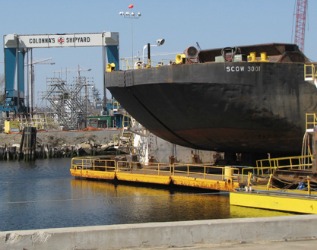A worker at Colonna’s Shipyard in Norfolk, Virginia (VA), suffered injuries requiring hospital treatment when the backhoe he was driving got hit by a small Norfolk Southern locomotive. According to WAVY-TV 10, the collision occurred at a marked but uncontrolled grade crossing inside the work zone, and no railroad employees suffered injuries.

The crossing does not have gates or warning lights, which is common in private rail yards like those incorporated into the physical plants of factories, warehouses, shipyards and ports. Leaving the crossings open makes sense from a business standpoint. Bringing vehicle and equipment traffic to a complete halt multiple times each day every time a train engine or set of railcars moves would seriously hamper workflow and productivity.
That focus on the bottom line, however, leaves both company employees and train crew members at constant risk for accidents like the one that happened at Colonna’s on the afternoon of February 5, 2015. As a personal injury and wrongful death attorney who has specialized in helping victims of rail accidents since the mid-1980s, I’ve seen several incidents like this one. One of the worst, and most deadly, involved a van transporting a BNSF crew through a rail yard in Washington state. A breakdown in communications regarding where trains were in use and what route the van should take appears to have contributed to that tragedy.
Stopping a locomotive takes time, even when it is relative small and moving slowly. When physically keeping people and vehicles out of a train’s way proves impractical, the solution to avoiding collisions lies in keeping communications open between the crew on board — typically only one engineer or conductor — and the people on the ground. Spotters and dispatchers have major roles to play in this.
I hope the injured shipyard worker recovers quickly and fully. Even more, I hope the problems that led to the accident in which he got hurt are identified and corrected.
EJL





